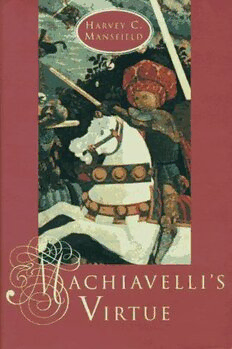
Machiavelli's Virtue PDF
Preview Machiavelli's Virtue
MACHIAVlLLI'S VIRTUE A C H I C. HARVEY MANSFIELD , A V E L L I S V I R T U E THE UNIVERSITY OF CHICAGO PRESS CHICAGO & LONDON The University of Chicago Press, Chicago, 60637 The University of Chicago Press, Ltd., London © 1966 by The University of Chicago All rights reserved. Published 1996 Paperback edition 1998 Printed in the United States of America 05 04 03 02 01 00 99 98 2 3 4 5 ISBN: 0-226-50368-2 (cloth) ISBN: 0-226-50369-0 (paperback) Library of Congress Cataloging-in-Publication Data Mansfield, Harvey Claflin, 1932- Machiavelli's virtue I Harvey C. Mansfield. p. cm. Includes bibliographical references and index. 1. Machiavelli, Niccolo, 1469-1527-Contributions in political science. 2. Machiavelli, Niccolo, 1469-1527-Ethics. I. Title. ]CI43.M4M355 1995 320.1'092-dc20 95-24115 CIP 8 The paper used in this publication meets the minimum requirements of the American National Standard for Information Sciences-Permanence of Paper for Printed Library Materials, ANSI Z39.48-1992. CONTENTS Abbreviations Vll Preface ix PART ONE MACHIAVELLI THE PRINCE I Machiavelli's Virtue 6 PART TWO MACHIAVELLI'S BEGINNINGS 53 2 Necessity in the Beginnings of Cities 57 3 Burke and Machiavelli on Principles in Politics 79 4 Machiavelli and the Idea of Progress 109 PART THREE MACHIAVELLI'S BOOKS 123 5 An Introduction to Machiavelli's Florentine Histories 127 6 Party and Sect in Machiavelli's Florentine Histories 137 7 An Introduction to The Prince 176 8 An Introduction to Machiavelli's Art of War 191 9 Strauss's Machiavelli 219 PART FOUR MACHIAVELLI'S POLITICS 231 10 Machiavelli's New Regime 235 I I Machiavelli's Political Science 258 12 Machiavelli's Stato and the Impersonal Modern State 281 13 Machiavelli and the Modern Executive 295 Notes 315 Bibliography 351 Index 361 ABBREVIATIONS In both my documentation and parenthetical text references, page numbers citing the works of Niccolo Machiavelli (NM) refer to his Tutte Ie opere, ed. Mario Casella and Guido Mazzoni (Florence: G. Barbera, 1969). His works are abbreviated as follows: AW Art of War D Discourses on Livy FH Florentine Histories P The Prince All translations are my own. vii PREFACE Machiavelli as the principal character in his own thought: that is the theme of this collection of articles and essays. The articles are presented in formal dress, supported by footnotes, and the essays were written for occasions when the textual proof of one's state ments is not expected or desired, and when arguing with authority is otiose. All begin from or come to Machiavelli's "strange sugges tion that he was a prince." In describing princes, which he does in all his writings and not only in his most famous book, called The Prince, Machiavelli was explaining himself and his undertaking. That "strange suggestion" is distinctive, but it is not original with me. It can be found in Leo Strauss's Thoughts on Machiavelli, published in 1958, a work whose reception is related in chapter 9. I have followed out Strauss's general suggestion and some of the many, many specific points contained in that marvelous book. Strauss combined two opposite reactions to Machiavelli's work. The anti-Machiavellians, who after the publication of Machiavelli's major works (posthumously, in 153 I) sprang up angrily to defend morality and religion in politics, saw well enough that Machiavelli was the first philosopher not merely to lack respect for the just, the noble, and the sacred or even to show his lack of respect-but actu ally to advise all others to act without respect. Modern philosophers following Machiavelli, such as Bacon, Spinoza, Montesquieu, and Rousseau, showing regard like Machiavelli himself for the power of moral outrage, cautiously took notice of his responsibility for initiat ing the escape of philosophy, and thereafter society, from the super intendence of Christianity. But Strauss was the first to argue the point in detail while never losing sight of the question raised by Machiavelli's immoralities and blasphemies. IX
